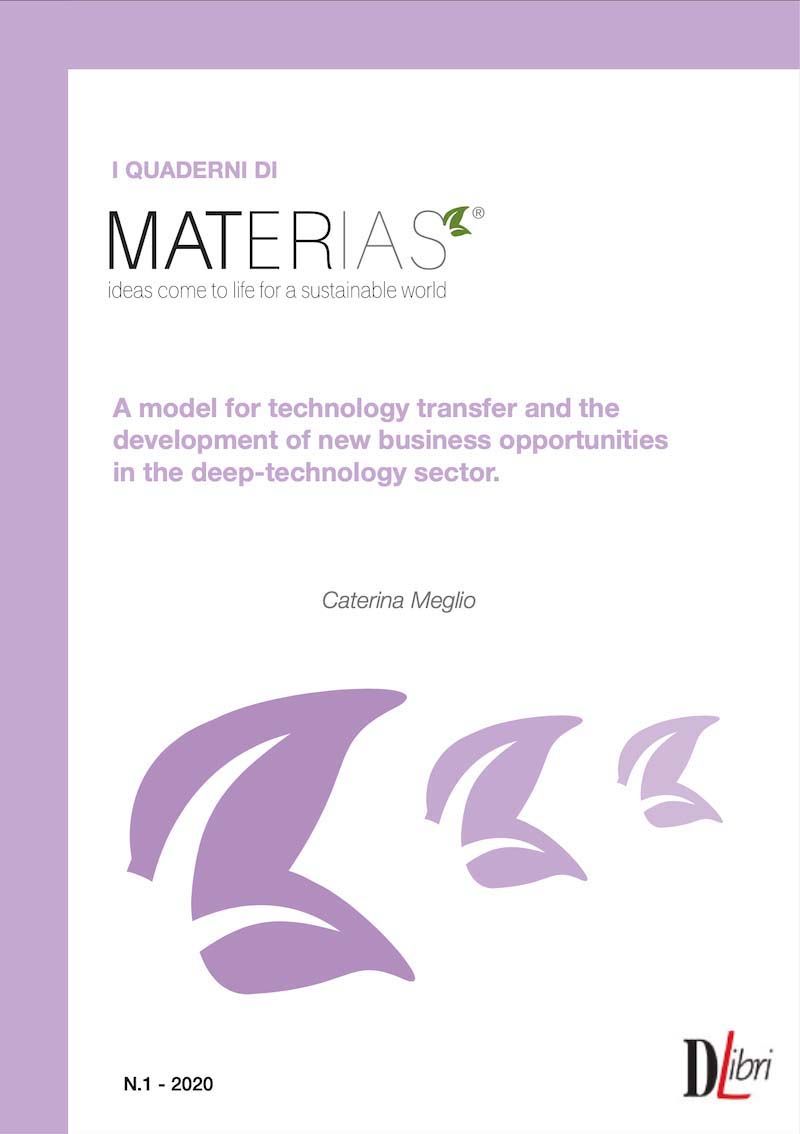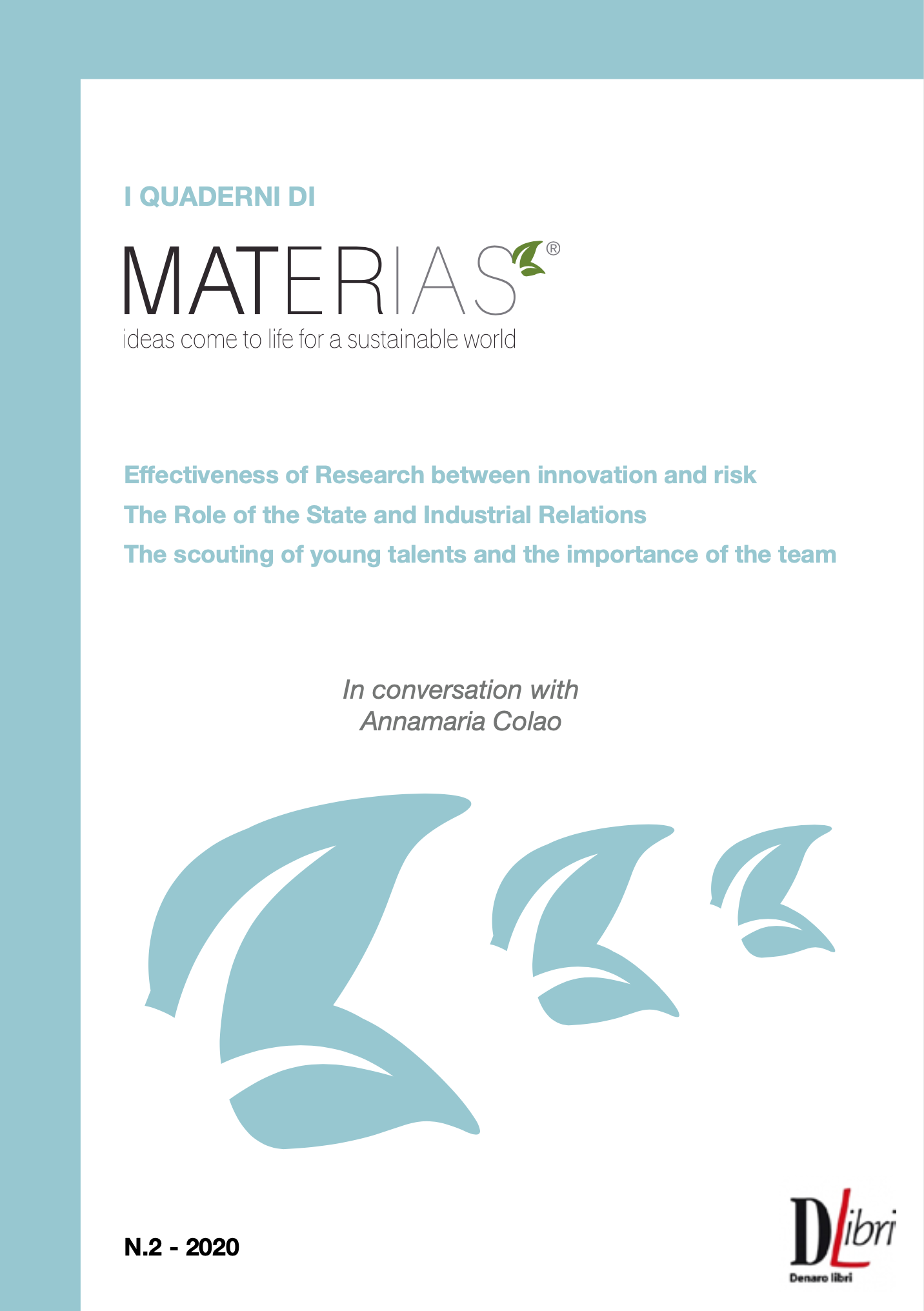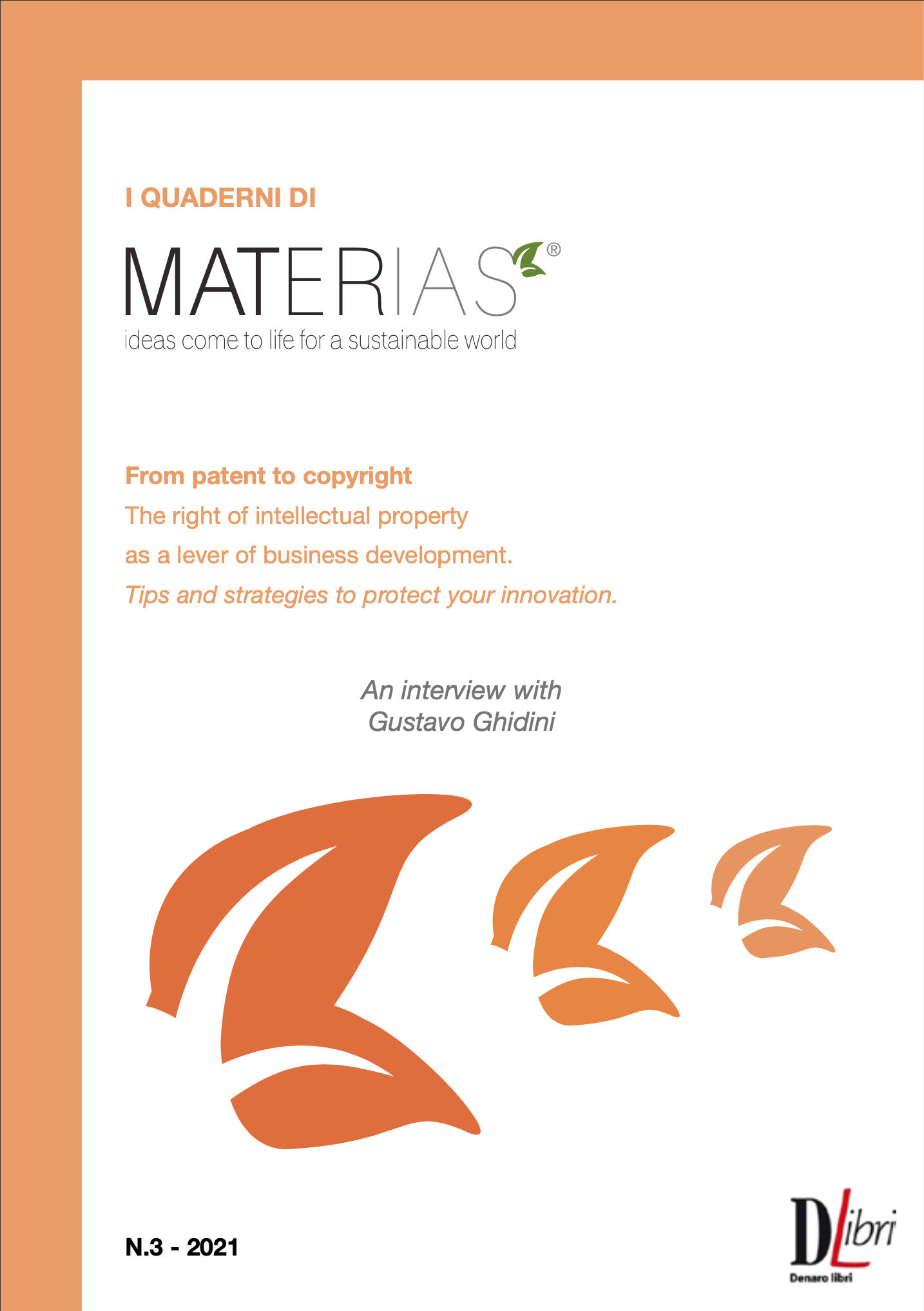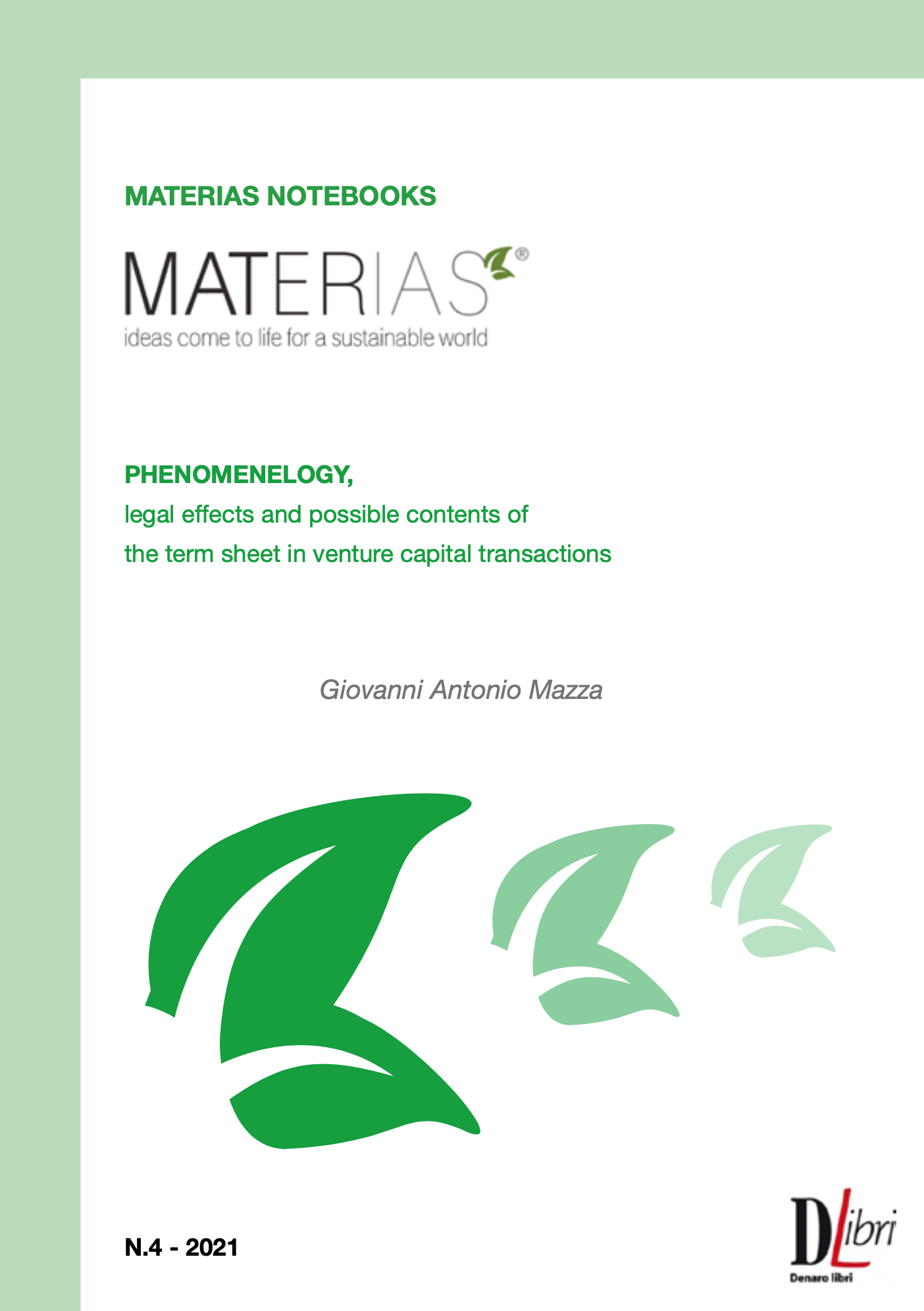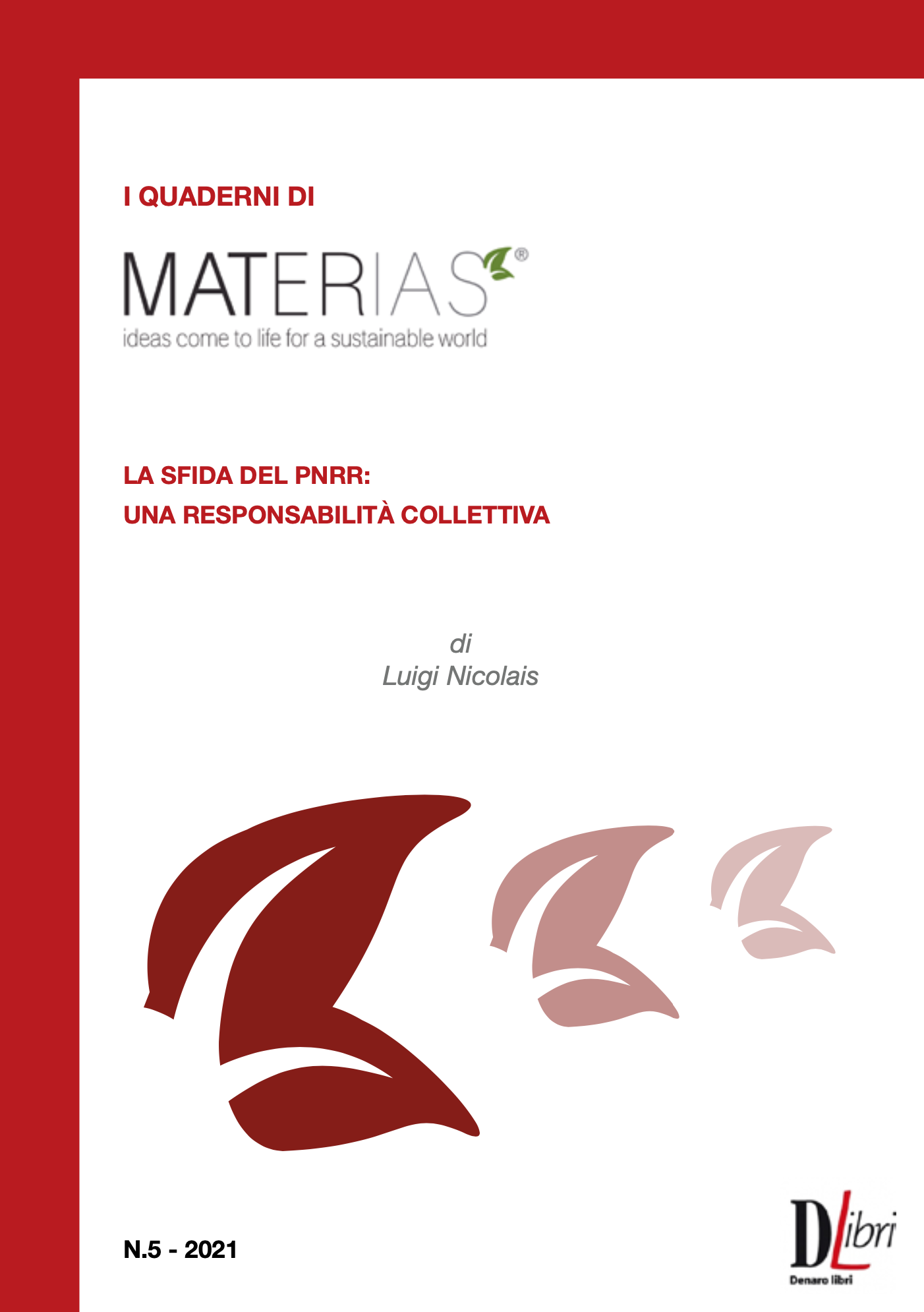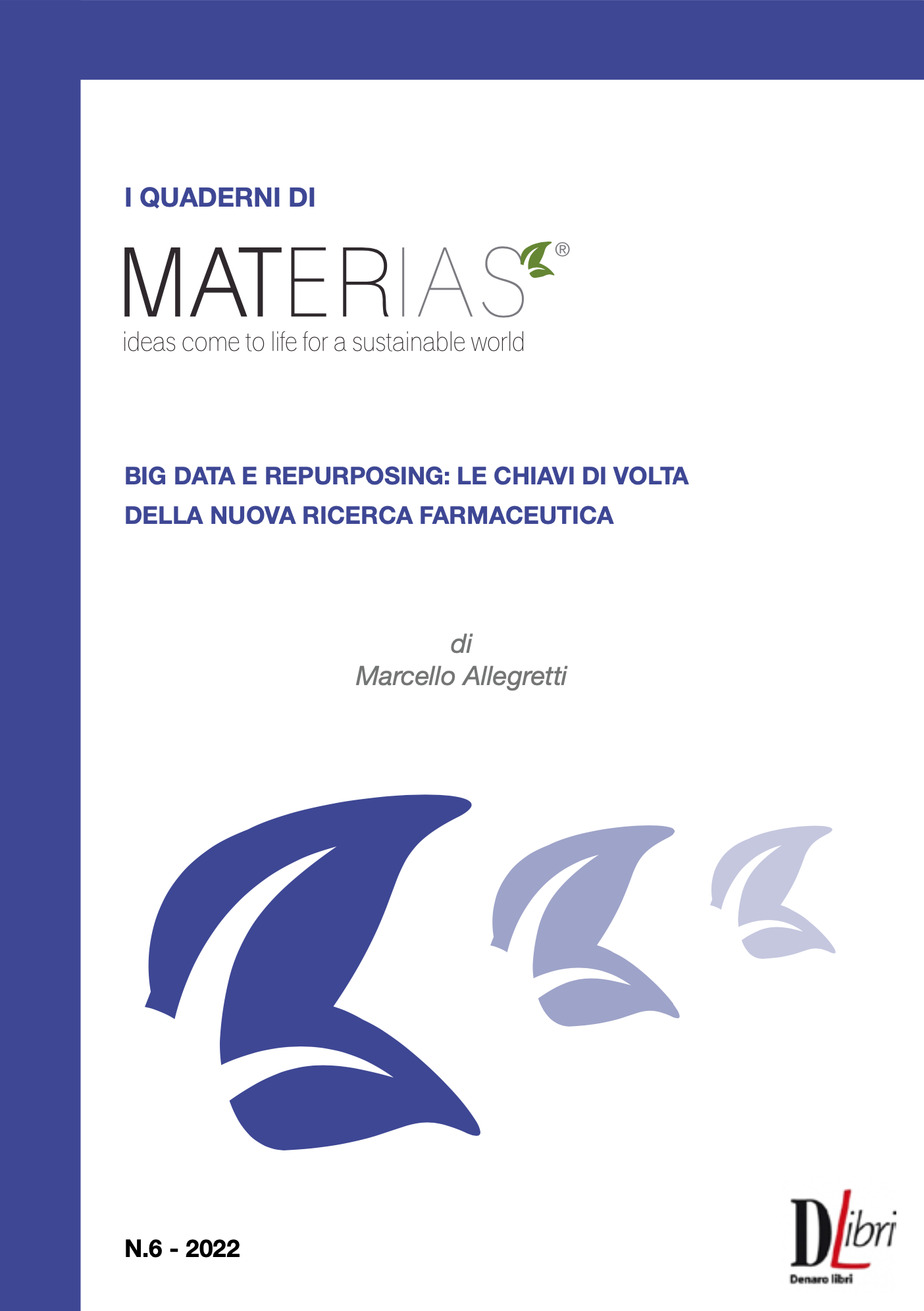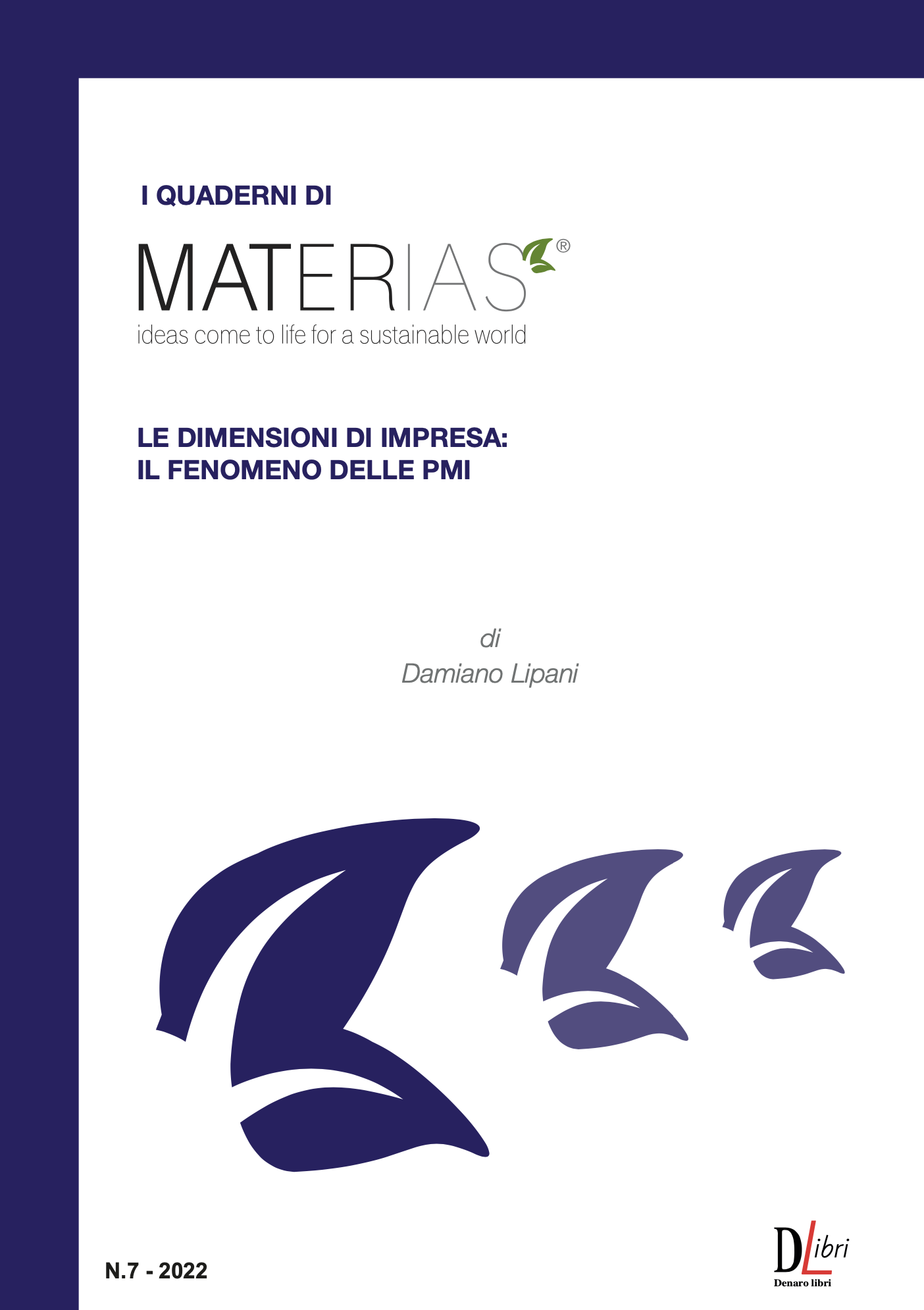N° 2
MATERIAS NOTEBOOKS
Effectiveness of Research between innovation and risk.
The Role of the State and Industrial Relations.
The scouting of young talents and the importance of the team.
In conversation with Annamaria Colao
12 - 2020

di Luigi Nicolais, presidente di Materias
Learning, searching, inventing: among these actions, which we carry out on a daily basis, is that of innovation, a constant application of research to transform our society to the fullest. This transformation arises from scientific audacity that finds its extension in the courage to tackle an entrepreneurial enterprise. This continuity must be expressed above all in the heart of universities, through young people, in the form of a relationship of trust and exchange between training, research and business. This is today’s challenge. Innovation cannot be reduced to an invention that meets the market. Behind the scenes of an idea that turns into a product are our emerging start-ups, the SMEs that develop patents. And this makes innovation the vital energy of the most compelling economy.
We are in the century of hyper-innovation that marks our society characterized by rapid, numerous and inevitable changes with an unprecedented pace. In a world where everything is accelerating, if we want to keep our future under our control and build it and not suffer it, strengthening our innovation model is a categorical imperative. However, one of the peculiarities of innovation is not responding to any order, to any pre-established process. Innovation thrives on freedom, openness, attempts and failures. It lives on movement, experimentation and danger.
Is this a mere result of the case? Obviously not. Because the unexpected is caused, cultivated and welcomed. And it is this state of mind that I would like to transfer to the young innovators of the universities, and it is this dynamic that will transform them into the game changers of tomorrow. This requires greater investments in research and innovation, specific financial instruments for young start-ups and increasingly effective collaborations between public and private sectors. A national innovation ecosystem capable of dealing with the phenomenon of human capital flight, that is, the so-called “brain drain”.
With this second issue of the “Quaderni di Materias” we talked about this issue with Professor Anna Maria Colao, a scientist who contributed with creativity and organizational skills to the growth of Italian research, providing important support for social objectives of primary importance.
Our country owes a great debt of gratitude to the genius of women, competent and courageous women who have left their mark on history and who struggle daily to break the “glass ceiling” that dominates them. I think of women like our Italian scientists who are achieving great results in the field of research in the battle against the Coronavirus, demonstrating their commitment to the community.
All this represents a common good for our country to cultivate. A way to go, as Altiero Spineli wrote, which will neither be easy nor safe, but which must be followed and it will be.
Deep-tech innovations are now called upon to provide technologically advanced solutions, based on disruptive engineering and scientific challenges. Otherwise defined as disruptive innovation, these intuitions have among their objectives the ambition to revolutionize existing markets or, in some cases, to create new ones. New markets that still do not exist today and capable, suddenly, of replacing consolidated products, companies and value networks. The business risks for those approaching this sector are therefore high. Venture investors are cautious. The technologies we are talking about usually require high capital, long times and uncertain returns compared to the already tested digital technologies, which - on the contrary.
They can base their growth on incremental innovations. In these cases, public funding becomes essential to cross the so-called “Death Valley”, that strip of land that separates the idea from the market and where unfortunately many scientific insights with a high content of knowledge lose their lives. Ideas that without the adequate financial support of an investor die in the bud.
Professor Colao, is there a need for a greater presence of the state in these processes? Is there still a need, in essence, for traditional grants and projects from public institutions to support research? Initiatives on which private finance can be asked to co-invest at a later time
“In my opinion, this is actually a serious mistake that our country has made. In fact, our country has invested a lot only in industrial research and in applied research. As if to say “I don’t want to run the risk of investing in free thinking”. And this is wrong. Because it is essential that the state give concrete support to young researchers, to our free thinkers. Otherwise we will only ever have a research that must immediately lead to a result. Which would be a major limitation. The original thought must still have someone to finance it and only the state can do it. I don’t think that, for example, you have to get to a prototype to get funding. Because who knows how many prototypes we have lost because that intuition did not find the right response before its practical test. Finance cannot replace the absence of public institutions. Private finance fails to give the answer we expect. This is because finance does its job and does not invest without a grant. This is because research does not always lead to a result. We must put it in the list of possibilities. Of course, in some cases, a study can lead to a response that changes the life of humanity, but it may also be that time and academic work have been invested in something that leads nowhere. This risk is part of the research. And I believe it is a risk that only the state can afford to take on its shoulders”.
The scouting of ideas is one of the cornerstones of the Materias model. The main driver for the selection of innovations is essentially represented by four parameters: the novelty of the idea, level of innovation, industrial applicability and market potential. But there is also another type of scouting that the world of research and innovation must look to, and it concerns that of young and brilliant minds to be encouraged. Do you think this is a necessary activity to prevent them from going elsewhere, far from the South and from Italy, in order to achieve their goals?
“There is no doubt. I scout young researchers all the time. Usually I’m not looking for them but they are looking for me. Perhaps because they know they are finding someone with an open mind who can help and support them. I have this luck. Scouting is an integral part of the researcher’s work. Very often intuition is transformed into a real project thanks to the comparison and dialogue with several actors. This should also be explained to those who think that research is a solitary phenomenon, relating to the great thinker who goes to the laboratory alone and finds out who knows what. This belongs to a romantic and anachronistic view of research. The real research, the current one, is instead based on teams of minds, each with its own specificity, which by putting together the experiences and the nature of the different professionals gives birth to those extraordinary and innovative ideas. If we use technologies such as smartphones on a daily basis, rather than the microwave oven, it is always due to an initial intuition which was then transformed into a prototype and then into a product. Research is much more practical than the non-expert public might think”.
Professor Colao, first you mentioned the importance of the team, a concept that also finds full application in your field, in the medical field, with the presence of multidisciplinary teams that every day allow medicine and science to save lives and make steps forward in terms of quality of life. Today networking appears increasingly a necessity even in the early stages of research. What do you think of the Innovation Ecosystem that has allowed companies such as Materias to come into contact with excellent structures, both public and private, national and international, creating not only value in terms of networking but providing a decisive contribution to the development of important technologies?
“The world of research has various aspects that can discourage the inventor from implementing his own idea. For a very long time, for example, there has been this crazy approach, according to which the study of phenomena, scientific intuition, discoveries should not have been mixed with economics and money. Or there was, and still is, the fear that someone might appropriate your idea, blowing it from you. There are as many pirates in our work, as more or less in everyone’s work. However, scientific research also serves to ensure that the publication that is made, and the originality of that publication, remain with those who published it. So what is the nodal point? The key point is to choose the right partners with whom to disseminate your initiative. Because it is inevitable that this will happen. If you keep that idea only for yourself, what is it for? The key point is instead to have a network of subjects involved in various capacities, as Materias is doing, to share ideas and principles from which to start to reach the market. Because it’s easy to say ‘I had an idea’. The problem does not only concern the idea, which is certainly the result of a very delicate intellectual work, but the implementation of that idea, that is, how to transform the idea into something concrete. And this aspect is not something trivial. It is a complex story, which requires a lot of work. I believe that it is right and appropriate to have a partnership that allows us to make a qualitative leap. An ecosystem in which the different entities - science, finance, industry - speak the same language to find the right place for an idea."
Some several tools and strategies can be implemented to enhance the research results. For example, would it be appropriate to increase bonus and incentives to encourage patenting and the creation of new startups and spin-offs?
“Sure. This is a middle ground between the immediate financing of a prototype to be placed on the market and the complete abandonment of that line of research. I believe that startups and spin-offs are the right tools, which could allow you to do some more tests before discarding the idea. It seems to me an absolutely viable path. I must also say that there has been some movement in the Campania region on startups lately. I would therefore continue to work in this area and invest. Maybe not just looking at unrealistic and futuristic research, such as the famous cancer vaccine, which is something that has no real sense for a researcher who deals with the subject. But looking at something more concrete, a vaccine, for example, for certain types of cancer. This yes. Why not? Work aimed at resolving a specific pathology must be supported and encouraged. It is a valid and right way to go”.
The Fraunhofer-Gesellschaft model is unanimously recognized as an excellence in the field of research on an international scale. The distribution of the Institutes on the German territory is carried out in such a way as to locate the operational nodes near the most prestigious university centers present in the various lands. The proximity to a university hub constitutes an irreplaceable channel through which the sources of scientific knowledge are accessed and allows you to come into contact with talented young students, graduates or doctoral students to be involved from the very first years of academic attendance in applied research projects.
The Fraunhofer’s policy is characterized by the presence of young researchers within the organization. the presence of young researchers is not a point of arrival but a fundamental moment of transition and passage between the university and the world of industry. The operational structure was intentionally created as a platform of passage and transit for researchers, who already from the first months of joining the organization are directed to the world of work.
Professor Colao, what do you think of the Fraunhofer-Gesellschaft? What should our country do to get as close as possible to this model? The enhancement of human capital, in particular the new generations, is still a chimera in our country. What do you think?
“All the scouting initiatives of minds, and young minds, are fine. But unfortunately we still do too little. Italy appears as a non-meritocratic country and this is a serious situation to face. We are losing the best assets because we fail to give them a turnaround signal. So Italy is getting impoverished. Every year we train brains and then we lose that preparation, that added value, because we donate it to other nations that are more attractive than ours. It would be appropriate to brush up on happy operational insights, as we did some time ago. I remember, for example, that the Miur announced competitions, 7/8 years ago, to select young researchers. This allowed us to recruit young talents with dedicated allocations, which went beyond the FFO (the Ordinary Fund). This opportunity was implemented with a national commission and the involvement of candidates from all disciplines, from engineering and technical to those of the geological, medical and basic research, up to the humanities. Young researchers were hired from all over Italy. So, I would go in that direction. I would invest a part of national and EU funds every year only on young people. And this is something that our country must do. I would be wary of leaving research funding in the hands of industry alone. Because if the researcher has an idea that differs from the entrepreneur’s area of interest, he will be forced to give it up. Investments in research can only be made if the state is behind it. This does not mean that the industrialist cannot be the patron, but the doubt will always remain that if the researcher goes in the opposite direction to him, he can block his innovative idea."
According to your point of view, should we start with university students or focus on even younger?
“This is precisely the point. Then there is another aspect which is the real gap in our entire formation. The Italian population from a scientific point of view is ignorant, because it has not received any education in the subject since the school age. Science teaching is covered by the legal system but as it is it is useless, it does not teach the reasoning of the scientific method. In reality, what we Italians would need to have the brains for research is to teach children how to ask themselves questions in the scientific field, how to design a model through which to answer a question that is still unanswered. All this has serious consequences that lead to the rise of No Vax, to the so-called Negationists, and to all those phenomena that group people who think that reading a few lines on any social network is enough to say 'I understand and I don’t do this because it is a fraud of the state' ".
What is needed or what is missing to get out of this misunderstanding?
“There are some basic points missing from people’s curriculum. At school, unfortunately, they do not teach fundamental aspects concerning the scientific subject, ie that data can be read in many different ways. It is necessary to go to the origin of the data, that the data has a statistics and that if the statistical method is wrong it will inevitably end up coming to a wrong conclusion. These are all notions that should be taught in school. Just as health education should be taught at school. With the Unesco chair we are carrying out, for example, a project on the health of adolescents and we are realizing that the ABC is missing. If certain things are not taught at school, how can one expect that one can grow with the right awareness. And this is also the reason why it can be falsely thought that the same people always enter certain mechanisms as in universities as well as in large organisms. But this suggestion is also due to the fact that those who are outside this system do not even have anyone who teaches them.
Fortunately, there are young people like this and I have the pleasure of knowing some of them, because even among my collaborators there are young people who come from completely different worlds from medicine and research and who have made an independent journey. Either you fall into this category, or you risk being cut off from the processes. There are egregious people, in the literary sense of the term, out of the fold, but - with a different teaching method at school - we would probably have had many more.
The truth is that in the university we intercept young people very late to give them a training course. I am not a statist, I have always had sympathy for the world of the private sector, but it is undeniable that today there is a share of all these arguments that should be held by the state. Because it is the only body that has no partisan interests. The industry must come later. That is, after the great researchers have been trained, there may be an industrial competition for who will hire the best brain and pay for it the most. But this has to happen later”.
Do you think that the researcher remains central and is the real added value of the whole process?
“Obviously, but the researcher is already the next figure who was able to make a choice and face a solid and qualified training path. We should arrive a little earlier to select young people. We could do something like what Germany is doing but in a better version, not only with the contribution of the private sector, but with the decisive contribution of the public sector. The state should act on children from the last years of high school”.
The state, for its part, has tried to direct the youngest, through the reforms of public education that have followed, towards the world of business and research. Think, for example, of school-work alternation. In your opinion, is this the right path?
“Not at all. It is not a real school-work relay. It was interpreted by the children as a moment of recreation, not as a moment of training. These things must be built long before, this type of reasoning and awareness must be managed in advance in the life of young people. Only those children who have already shown a passion for science should be sent to the laboratories. Otherwise we shouldn’t be surprised that it becomes a great recreation. In my opinion, reasoning on a large scale cannot be done like this, from above “.
In 2012, the US magazine Forbes coined the expression game changer to refer to a figure who has the aptitude for changing the rules of the game, thinking outside the box, challenging the innovative limits of companies and, in so doing, creating new business opportunities. In your opinion, can such a model serve to bring young people closer to research and to relaunch the relationship between knowledge and business?
“I think that using the technique of competition to go further is an excellent idea, bringing together people who come from very different sectors opens up precisely this perspective. It may happen that a molecule born in a specific field turns out to be interesting if applied in different fields. And almost always this awareness arises from the fact that in a meeting someone came up and proposed trying to use it in another way. And maybe most of them hadn’t thought of it. Because the preparation base did not allow to see those results. In short, anything that can increase the possibilities of using scientific insights must be encouraged and the game, the challenge, goes in this direction”.
There are a lot of startups that fail today. Survival rate certainly depends on many factors, not least that linked to the ecosystem that hosts them, to the point that someone compares their birth and development to that of a plant in a rainforest (Horowitt and Hwang, 2012). Although the evolutionary theory of the firm maintains that selection mechanisms are a necessary phenomenon (Aldrich, 1999) and that the failure of new firms is a physiological event (Watson et al., 1998; Zacharakis et al., 1999). The term “fail” often carries with it a rather negative meaning, incorporating the assumption that anyone who carries out an entrepreneurial activity and for whatever reason does not see the desired results materialize will be banned as “failed”.
In the world of startups, however, the concept of failure should not be seen with an exclusively negative meaning. Rather, it would be appropriate to appreciate the constructive aspects, the growth of the entrepreneur and the ecosystem in general. The closure of a company can make the entrepreneur understand his mistakes in defining the organizational structure and improve the approach to the market in order to define more accurately and also with a more prudent business management. A person who has already made some mistakes wrong will hardly persevere in the error.
Professor Colao, do you believe that our researchers, as well as our startuppers, have the right to make mistakes?
“Research is also made up of failures, a study does not always lead to a positive and successful result. But the failure must also be disclosed, because it allows other researchers not to waste time on the same line. If that path has not been favorable, everyone must be informed. It can be a warning. A way of saying ‘don’t do that because we’re not going anywhere’. I understand that public opinion may not understand it, but failure can also be useful information for those who do research. Sometimes, in fact, it is not the idea that fails but the procedure, the method”
In the collective imagination, it may happen that the work of those who do research is not fully appreciated. Is there a risk of breaking the pact of trust between people and the scientist?
“I always say that if there hadn’t been research, if there hadn’t been Carlo Erba, we would still be there to peel off the willow bark and infuse it hoping that the headache would pass.” It was Carlo Erba who extracted acetylsalicylic acid from willow, transformed it into a tablet and named it aspirin in honor of Sant’Aspreno, the patron saint of head disorders. So we had aspirin. Research is always made up of steps. The idea that the scientist is a person out of this world, who is inside a laboratory making strange mixtures from which miraculous products come out is an iconographic reconstruction that has nothing to do with what the researcher is doing today. The researcher is a curious person, who does not stop at conventions, but who asks himself questions. He studied to develop models capable of scientifically answering those questions. And he will try with all of himself to come to a conclusion that fully satisfies him. If not, he will start all over again, until he has found the solution that according to his criteria and his preparation is the most plausible under the given conditions. People have to trust science, because that’s how the world has progressed”.
One last question on the Covid-19 pandemic. It is now clear to everyone that we must live with this virus and research is making enormous efforts to provide populations with health surveillance tools capable of limiting the spread of the epidemic. Can we do more? Is the road we are following the right one?
“Tracing the virus remains the most important thing to avoid the emergence of new endemic outbreaks. Any innovation that allows us to test large communities quickly must be supported and encouraged, because that’s exactly what we need to do. In the end, it must be admitted that this epidemic, from the point of view of research, is allowing science to demonstrate an extraordinary ability to develop technologically advanced solutions. The methodology used in this moment of enormous crisis will be useful in other difficult situations. Experience is always needed by those who remain, who will see what has been done by studying and will make another piece to add to the existing know-how. The humility of the researcher lies precisely in learning from everyone and not being disheartened by negative results. Because if the phenomenon is well studied, sooner or later the solution will come”.



